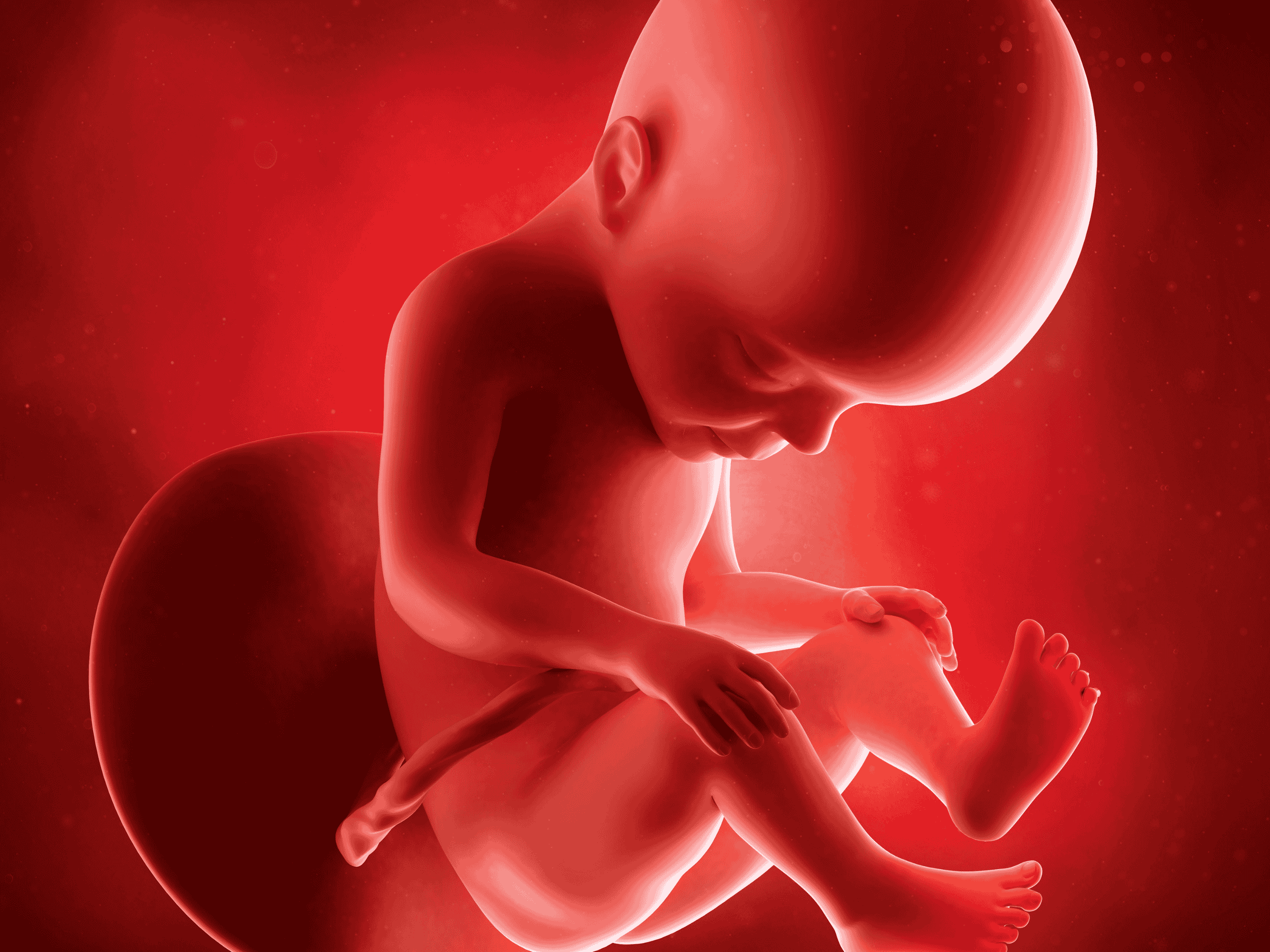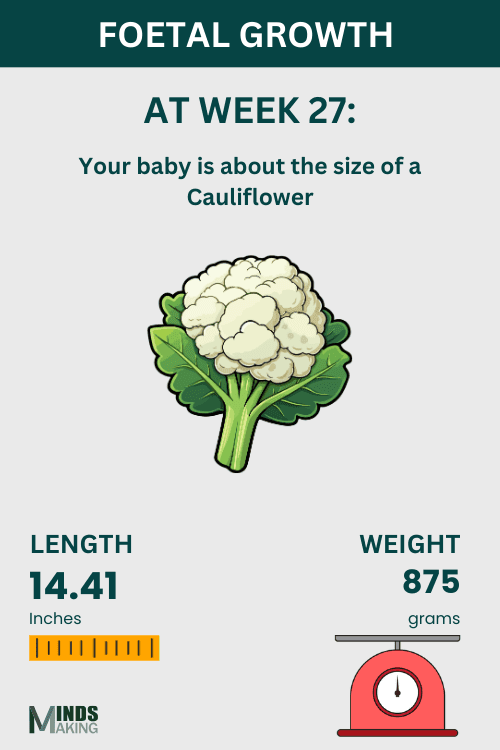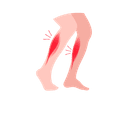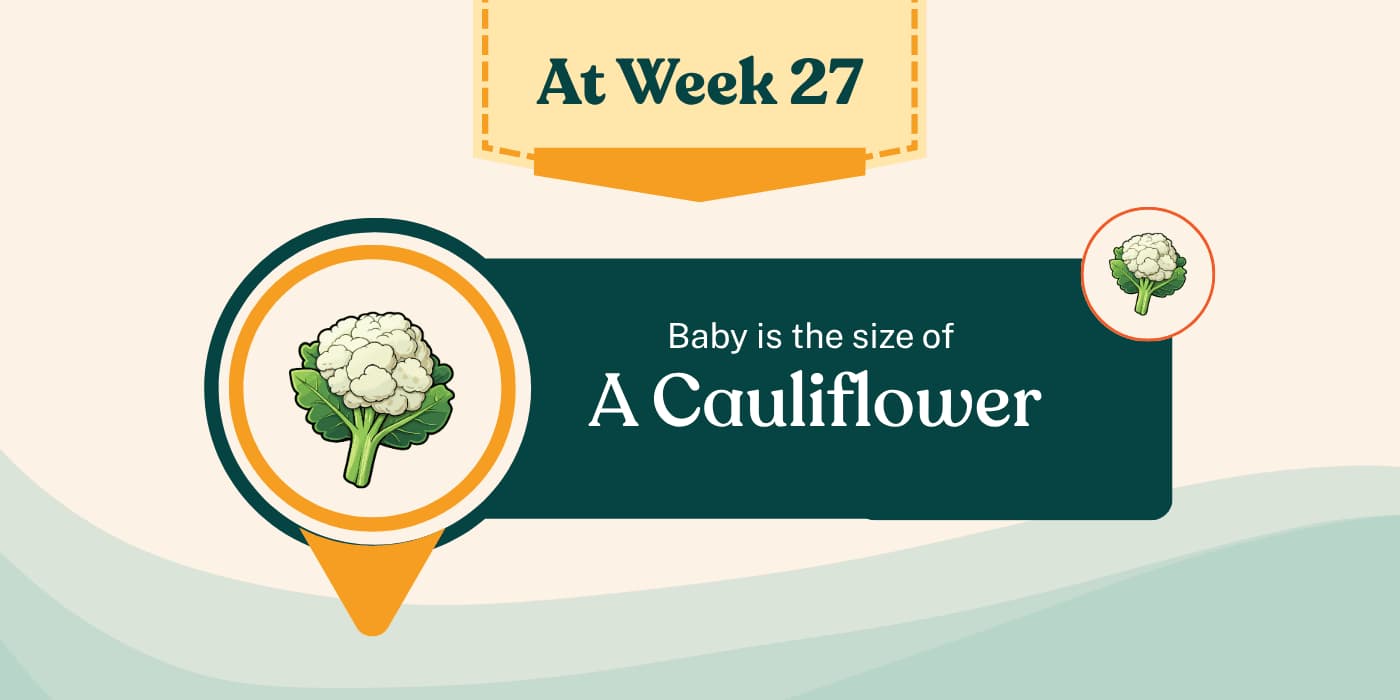Your Pregnancy at Week 27
Sciencephoto

Written by Mindsmaking Medical Writer
Fact Checked by Mindsmaking Professionals
1st, December, 2025
At 27 weeks pregnant, your baby has nearly doubled in weight to 875 grams, measures about 14.41 inches, and is developing muscle tone from all the kicking and rolling.
At 27 weeks pregnant, you're finishing your second trimester and moving into the third. Your baby is beginning to develop muscle tone due to all the kicking, rolling, and punching it's been doing, and you may be experiencing some unique pregnancy symptoms. By this stage, your baby has nearly doubled in weight over the past 4 weeks, now weighing 875 grams and measuring around 14.41 inches in length, roughly the size of a cauliflower.
Key Takeaways
Your baby's hearing is developing, allowing them to recognise voices, although sounds may be muffled due to vernix covering the ears.
Your baby measures 14.41 inches and weighs about 875 grams, comparable to a cauliflower.
As your baby grows, you may experience intensified discomforts such as heartburn, increased weight gain, back pain, and swelling.
By 27 weeks pregnant, your fundal height is typically around 25 to 28 centimetres (approximately 10 to 11 inches). This measurement usually corresponds closely to the number of weeks you've been pregnant.
Snoring is quite common at this stage of pregnancy because your nasal passages are more prone to swelling and congestion.
Adequate pre-pregnancy iron levels and a diet rich in iron can reduce the risk of anaemia during pregnancy.
Consider adding swimming to your workout routine, especially at 27 weeks pregnant, as it provides a great workout, gentle on joints, and helps relieve aches and pains.
Taking charge of physically demanding tasks like lifting heavy objects or climbing ladders can prevent discomfort or strain for your pregnant partner.
Singing lullabies or nursery rhymes and talking to your baby are great ways to establish connection and comfort.
Take a peek

Baby dreaming
Your baby's brain tissue continues to develop, and they are becoming very mentally active and might start dreaming around this time.

Ear plugs
Although your little one can hear you, be aware that it is muffled because the vernix caseosa, the greasy cheese-like protective coating on the skin, still covers the ears.

Hiccups
If you have unusual belly movements, they could be hiccups. The possibility of hiccups rises as the baby's lungs continue to develop.
Baby Development at Week 27
A few weeks ago, your baby was wrinkled like a prune. Now, those wrinkles are smoothing out as fat accumulates under the skin. Your baby's organs are also maturing, preparing for life outside the womb.
Based on their movements, you will notice that your baby is developing a more regular sleep and wake pattern. You might also feel them hiccupping for a few minutes, which is normal and not a cause for concern, as it doesn't cause your baby any distress.
Your baby's brain tissue continues to develop, and they are becoming very mentally active. Some experts even suggest that babies might start dreaming around this time, though what they might dream about is unknown!
While the liver and immune system are still quite weak and the lungs are immature, they can function. If your baby were to be born this week, there would be a 90% chance of survival. However, they would require substantial medical assistance and would need to stay in an incubator for a significant period.
As your baby's hearing develops, they may recognise your voice and your partner's. Although sounds are somewhat muffled due to the ears being covered in vernix; a thick, waxy coating that protects their skin from becoming chapped by the amniotic fluid, your baby can still hear and start to familiarise themselves with external voices. (7)
Mindsmaking

Body Changes at Week 27
You've been pregnant for over 6 months, and your body has undergone numerous adjustments, with more to come as you approach your baby's arrival. Common discomforts such as heartburn, increased weight gain, back pain, and swelling may intensify as your baby grows.
Around the end of week 27, your doctor may administer an Rh immune globulin shot. This injection prevents the development of antibodies that could harm your baby, and it's essential for women whose blood lacks a specific antigen protein found in red blood cells. Whether you require this shot depends on your blood type, which determines the presence of the antigen. (2)
As your belly expands, your rib cage expands to accommodate your growing uterus, which shifts upwards and outwards. This expansion can sometimes make you feel breathless due to insufficient space restricting your lungs from expanding. Taking deep breaths as needed, maintaining a good posture, and avoiding slouching can give your lungs more space to breathe and better oxygenate you and your baby.
You may also notice itchiness on your belly this week, similar to the sensation of ants crawling on your skin. This is often caused by stretching collagen fibers in the middle layer of your skin. Applying moisturizing cream after showering, using moderate water temperatures, and avoiding drying soaps can help alleviate this discomfort.
Read This Next
No posts available
Baby Bump At Week 27
By now, your fundal height, the distance from your pubic bone to the top of your uterus, is typically around 25 to 28 centimeters (approximately 10 to 11 inches). This measurement usually corresponds closely to the number of weeks you've been pregnant. Your healthcare provider will likely measure your fundal height at each visit to monitor the size of your uterus and your baby's growth.
At 27 weeks pregnant, you're likely still getting used to the changing size of your bump and the weight gain associated with pregnancy. You may also be experiencing new aches and pains as your belly grows. These are normal adjustments as your body accommodates the increasing size of your baby and uterus.
Pregnancy Symptoms at Week 27

Haemorrhoids
During this stage of pregnancy, hemorrhoids are quite common. The hormone progesterone, typical in pregnancy, relaxes the walls of blood vessels, causing them to swell. This, combined with the pressure exerted by the growing fetus and constipation, increases the likelihood of developing hemorrhoids. To prevent hemorrhoids, drinking plenty of water and consuming high-fibre foods such as whole-wheat bread, fruits, and vegetables is beneficial. These dietary choices help maintain regular bowel movements. If you're experiencing discomfort, applying a cool compress or witch hazel-soaked pads to the affected area can relieve you.

Urinary incontinence
You may experience urinary leakage because hormonal changes cause the pelvic floor muscles to relax, reducing support for the bladder. Factors such as older age, intake of caffeinated drinks, or being overweight can increase the likelihood of experiencing incontinence. Additionally, chronic medical conditions like diabetes, asthma, hypertension, and constipation may also contribute to urine leakage during pregnancy. Switching from coffee, tea, and soda to drinking water can help alleviate urinary incontinence symptoms. Practicing pelvic floor exercises like Kegels and consuming enough fiber is also beneficial. Also, consult your doctor or midwife, as they can check for a urinary tract infection (UTI) and offer further assistance.

Cramping
Unfortunately, cramping tends to worsen as your pregnancy progresses. Leg cramps often become more frequent at night and occur during the day. When a cramp hits, stretching the calf muscle can provide relief. Try straightening your leg and gently flexing your toes back toward your shin. Walking for a few minutes or massaging your calf may help alleviate the discomfort. Insomnia: At 27 weeks pregnant, you might find sleeping difficult despite feeling very tired. Your mind could be racing with various thoughts and problems, keeping you awake into the early hours. Additionally, frequent trips to the bathroom during the night can further disrupt your sleep, contributing to insomnia. Instead of lying awake in bed, try repeating your bedtime routine. Get up to take a shower or read a book. It can be beneficial to have clean sheets, a pile of supportive pillows nearby, and a fan blowing across you to create a more comfortable and conducive sleep environment.

Snoring
Snoring is quite common at this stage of pregnancy because your nasal passages are more prone to swelling and congestion. This can make breathing more difficult and lead to snoring. To help prevent snoring, try sleeping on your side. This position improves circulation and reduces pressure on your organs and joints.
Pregnancy Concerns at Week 27
Thrush is a yeast infection that can result in a white discharge that typically doesn't smell. You might also experience itching or irritation. Thrush is quite common during pregnancy, particularly as you enter the third trimester. There's no need to worry excessively, as there is no evidence that thrush can harm an unborn baby.
However, it's important to speak to your GP or midwife before using any treatments for thrush, as some are not recommended during pregnancy. (9)
According to the NHS, premature labor, which is the onset of labor occurring before the 37th week of pregnancy, affects Approximately 8 out of every 100 babies. (5)
Suppose you are less than 37 weeks pregnant. In that case, it's crucial to promptly contact your midwife or maternity unit if you experience regular contractions or tightenings, period-type pains, a sudden gush or trickle of fluid from your vagina (which may indicate your water breaking), or backache that is unusual for you. These signs could indicate the onset of premature labor, and seeking medical attention promptly is important for both the mother's and the baby's health.
Watch out for symptoms such as breathlessness, tiredness, heart palpitations, dizziness, weakness, and headache, as they could signal anemia. Anemia is a common condition caused by low hemoglobin levels, essential for carrying oxygen throughout the body. Hemoglobin relies on iron for its production, and when iron stores are insufficient, hemoglobin levels drop, resulting in anemia. During pregnancy, the developing baby requires significant iron for growth, often depleting maternal iron stores. Not all pregnancies are affected; those with adequate pre-pregnancy iron levels and a diet rich in iron are less likely to experience anemia. (8)
Health Tips for Week 27
Get all the support you require
nancy pillow to support your belly at night. Emotional support is equally important as you approach your due date and your emotions intensify. Ensure you have someone to talk to, whether a partner, friend, or therapist, to help you process your feelings and provide the support you need
Stay active
If you're seeking a way to stay active now, consider adding swimming to your regular workout routine, especially at 27 weeks pregnant as your belly grows. Swimming offers a great workout, is easier on your joints than many other exercises, and can help relieve aches and pains. It is also an excellent way to stay cool and comfortable when you feel less than your best during a hot summer.
Prioritise rest
At 27 weeks pregnant, you might still have plenty of energy and be focused on making the most of your time before your baby arrives. Alternatively, you could be struggling to find rest due to the physical adjustments your body is making and the symptoms of pregnancy taking their toll. Regardless of your feelings, prioritising rest is essential as you progress into the third trimester. Consider adopting strategies to enhance sleep quality and reduce physical and emotional strain. This includes maintaining a consistent sleep routine, limiting liquid intake before bedtime, and practicing relaxation techniques to unwind before sleep.
Avoid infections
During pregnancy, the placenta protects the mother and the baby from infections. The immune response of the placenta to infections can influence the mother's vulnerability to illnesses. To safeguard your health and your baby's, it's important to take precautions to avoid certain infections. These include influenza, which can lead to complications such as pneumonia, especially in the later stages of pregnancy. A flu vaccine is safe and recommended during pregnancy to prevent flu-related risks. It is also important to be aware of toxoplasmosis, an infection that can be transmitted through cat faeces, and can pose risks like pregnancy loss or complications for the baby.
Exercise your pelvic floor
Kegel exercises are beneficial during and after pregnancy for several reasons. They help prevent urine leaks, keep hemorrhoids under control, and enhance vaginal muscle tone, which can make intercourse more satisfying. To perform Kegels, imagine trying to stop yourself from passing gas and urinating simultaneously, or as if you're lifting a marble with your vaginal muscles. Focus on squeezing and lifting your pelvic floor muscles without tightening your abdomen, squeezing your legs together, tensing your buttocks, or holding your breath. Consistency is key with Kegel exercises. Start slowly, performing a few reps at a time, and gradually increase the number as your muscles strengthen.
Advice for Partners
Assume responsibility for any physical tasks that could pose difficulty or discomfort for your pregnant partner, such as lifting heavy objects or climbing ladders. If you're tackling household organising or DIY projects in preparation for the baby's arrival, ensure your pregnant partner avoids overexertion. Her well-being and comfort are paramount during this period.
You can also help your pregnant partner if her feet are swollen by encouraging her to elevate her feet. Provide a comfortable pillow for her to prop up her feet and offer a relaxing foot bath at the end of the day to help reduce the swelling.
Pregnancy Checklist for Week 27
- Most hospitals require an infant car seat before you can take your baby home. If you haven't chosen one yet, now is the time to start looking. Seek recommendations from other mums or your paediatrician, and choose a seat that fits your car.
- Attend an infant safety and CPR class and ensure your vaccines are current. Although there's much to consider, it's wise to take care of these preparations before the baby arrives.
- Now that your baby can hear you, it's a great time to start bonding through your voice. Try singing lullabies or nursery rhymes to them. Talking to your baby can also be comforting and create a connection.
- Revisiting your finances and planning for your upcoming maternity leave is important. Consider how much time you can afford to take off work and coordinate the timing with your due date and your partner's leave.
- Start planning your childcare arrangements now. If family or friends will help, discuss your plans with them. If hiring a caregiver or considering daycare, begin your research and evaluations early to ensure a smooth transition when your baby arrives.
Frequently Asked Questions
How big is my baby at week 27?
Your baby starts to gain more muscles due to the kicking, rolling, and punching skills he has acquired so far. Your baby now weighs around 875 grams and measures around 14.41 inches in length. They can now be compared to the size of a cauliflower.
What is happening to my baby at 27 weeks?
At this stage, your baby is fully formed and focusing on growing bigger and stronger. While their lungs can breathe, the coming weeks ensure they are fully prepared for life outside the womb. Your baby now measures about 14.41 inches from head to heel, roughly the size of a cauliflower. Starting this week, they will look plumper and less wrinkled as their skin fills out and they start laying down fat.
How can I sleep comfortably at 27 weeks pregnant?
To sleep comfortably at 27 weeks pregnant, consider using a long pregnancy pillow to support your belly and help you stay in a side position, which can be challenging if you've always been accustomed to sleeping on your back. Keeping your knees and legs bent, and placing a pillow between your legs, can also relieve pressure and enhance comfort making it easier to relax and sleep soundly easier.
Can I ride a bike at 27 weeks pregnant?
Riding a bike at 27 weeks pregnant can be safe for some women, but it depends on individual circumstances and comfort levels. As your pregnancy progresses, your centre of gravity shifts, affecting balance and increasing the risk of falls. Comfort may also be an issue, as leaning forward over handlebars can become difficult. It's important to avoid intense or strenuous cycling, opting instead for a leisurely pace and listening to your body. If you have any pregnancy-related complications or medical conditions, such as preterm labour or preeclampsia, cycling might not be advisable. Always consult your healthcare provider before continuing or starting any exercise routine, and consider riding on smooth, flat surfaces to reduce the risk of accidents.
Will my baby feel it when I rub my belly at 27 weeks?
In the second and third trimesters of pregnancy, babies become increasingly responsive to external stimuli like the sound of your voice and the sensation of touch on your belly. When you rub your belly, your baby may react by moving their arms, legs, or head, showing awareness of the touch and possibly responding to it. This interaction through touch and talking to your baby is comforting and helps to begin forming a bond between you and your unborn child.
Was this article helpful?
How many stars are you giving this article?
Leave a comment
Your email address will not be published.










































